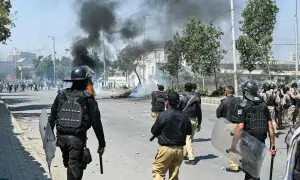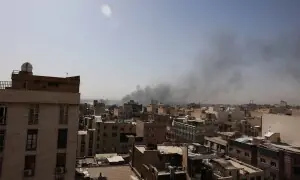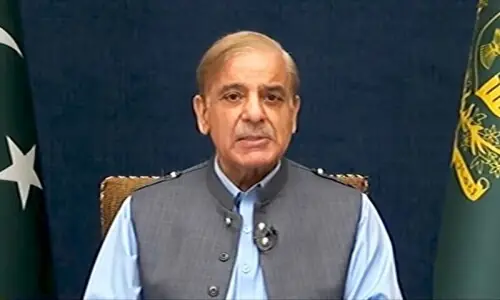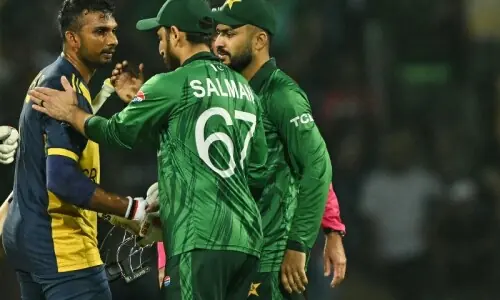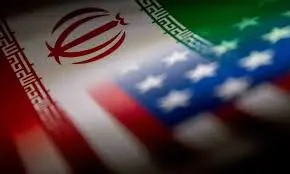Prime Minister Shahid Khaqan Abbasi met US Vice President Mike Pence on the sidelines of the United Nations General Assembly on Tuesday, with the two sides resolving to remain engaged and carry forward the relationship that has been on a downward trajectory since announcement of the US policy for Afghanistan and South Asia.
Abbasi’s meeting with VP Pence is the highest contact between the two sides since the policy was announced on Aug 21. Pakistan had after the policy announcement postponed the then planned bilateral interactions.
The meeting on the sidelines of the 72nd UNGA session in New York was held in a cordial atmosphere, a handout issued by the Foreign Office said.
"Prime Minister [Abbasi] shared Pakistan’s concerns and views with regard to the US strategy for South Asia," it said.
Also read: 'No point in PM Abbasi meeting US VP Pence at UNGA,' says Senate chairman
Abbasi and Pence agreed to work together to carry forward the bilateral relationship and discussed matters relating to peace and stability in Afghanistan and the region.
"It was agreed that the two countries would stay engaged with a constructive approach to achieve shared objectives of peace, stability and economic prosperity in the region," the FO statement said.
In his opening remarks, the US vice president greeted Abbasi on behalf of President Donald Trump. He recalled the strategy articulated by Trump on South Asia and said the US valued its relationship with Pakistan, a long term partnership for security in the region.
“We look forward to exploring ways so that we can work even more closely with Pakistan and with your government to advance security throughout the region,” he told Abbasi.
In response, Abbasi said Pakistan intends to continue efforts to eliminate terrorism in the area.
“We have made our contributions, we fought a very difficult war, we suffered casualties and have suffered economic losses and that is the message that we bring to the world,” he said. “We are partners in the war against terrorism.”
“It was a good meeting,” Foreign Secretary Tehmina Janjua told reporters after the 45-minute meeting that US had requested.
Responding to questions, she termed the progress made at the meeting as an “ice-breaker”. She said a US delegation will visit Pakistan next month to continue the process of bilateral dialogue, according to a Radio Pakistan report.
The foreign secretary said Abbasi during the meeting expressed concern over the greater role the new policy advocated for India.
Fractious Pakistan-US relations got further strained last month when President Trump unveiled his administration’s policy on Afghanistan and South Asia. The policy lays special emphasis on kinetic operations to subdue Taliban militancy in Afghanistan, envisions greater role for India in Afghanistan and the overall regional security, and has been particularly hawkish on Pakistan accusing it of being an insincere partner in the fight against terrorism.
The new policy, which was seen here as humiliating, disrespectful to Pakistani sacrifices in the fight against terrorism, and indifferent to Islamabad’s security concerns, prompted a re-assessment of ties at the highest level.
Editorial: Pak-US-Afghan cooperation is key
The process is yet to complete, but indications from different levels of government point towards an existing consensus that there is no other option, but to stay engaged with US.
Pakistan asks OIC to become voice of Rohingya's plight
Pakistan expressed “deep concern” over the ongoing Rohingya crisis on Tuesday, urging the 57-member Organisation of Islamic Cooperation to play a leading role and become a “voice of conscience” for the Rohingya.

Addressing the OIC Contact Group meeting at the UN headquarters, PM Abbasi assured the OIC that it would have Pakistan's “firm and abiding support to this virtuous cause”.
“Pakistan reiterates its commitment to take full part in any humanitarian effort by the OIC or UN to help the Rohingya Muslims,” the prime minister said.
Abbasi said over 400,000 Rohingya have been forced to flee their homes and seek protection and shelter in neighbouring countries, demanding an end to this “systematic and endemic discrimination”.
He said the international community must exert its utmost pressure on the Government of Myanmar to stop the carnage of the Rohingyas. Pakistan also demanded of the Government of Myanmar to take immediate steps to de-escalate the situation, and ensure safety and security of the Muslim Rohingya population.
The prime minister said Myanmar must create favourable conditions for the safe return of all Rohingya refugees and grant legitimate rights including citizenship, communal participation and representation and freedom of movement, to the Rohingya, as equal citizens of Myanmar.
Pakistan, Iran for deepening bilateral cooperation
Also on Tuesday, Pakistan stressed maintaining a positive trajectory in bilateral relations for promoting trade and economic cooperation with Iran.

Prime Minister Abbasi in a bilateral meeting with Iranian President Hassan Rouhani on the sidelines of the UNGA session also discussed strengthening of relations between the two countries, besides focusing on the issue of regional peace and security.
President Rouhani, reaffirming Iran's commitment to strengthen ties with Pakistan, emphasised that the two countries should work together closely in deepening cooperation in areas of border management, trade, and investment.
Abbasi thanked the president for Iran's support to the legitimate struggle of people of India-held Kashmir for their right to self-determination.
The two leaders agreed that there is no military solution to the Afghan conflict and a politically negotiated settlement is vital for achieving lasting peace in Afghanistan.
Underscoring that Afghanistan's neighbouring countries were seriously affected by the growing instability in Afghanistan, they emphasised the need for adopting a regional approach for bringing an end to the prolonged Afghan conflict.
Abbasi also held meetings with Turkish President Recep Tayyip Erdogan, King Abdullah of Jordan and Sri Lankan President Maithripala Sirisena.








